The Residential Year
I went back to Melbourne in May 2006 after my internship at BIRC in NTU and needed a place to stay since I had given up the apartment at Newmarket. I was temporarily staying with Michael Li at his apartment in College Square 2 at Faraday Street – which was when the full-blown drama with Andrew took place across the campus. I came to know Michael as a result of a Singapore students’ night at Gotham Penthouse (a club located at Clarke Quay) when Michael was the President of Singapore Students’ Society at Melbourne University.
Although Mike did not mind that I bunked into his place for a while, I should not stay there for too long. So I had to look for a place. One day, I saw some emails coming through that both Janet Clark Hall and University College were looking for Resident Tutors/Advisers. I applied to both and got interviewed. University College offered me a position the following day; thus, started my life as a Resident Adviser in University College (UC) for the next 2 years, until I left Melbourne on April 1, 2008. I recalled that the day I moved into UC was the intercollegial rowing competition at Yarra River. The residents were pretty rowdy during dining that evening but Genevieve assured me that that was not usual.
In the words of Genevieve Leach, Senior Resident Adviser and Director of College Welfare at University College, the role of a resident adviser (RA) is that of the night staff – we run and manage the entire college at night. There are 9 RAs including Genevieve and our duties are planned. This means that we will be on duty about 3 to 4 times a month. Each duty begins at 6pm and last till 7am the next morning for weekdays and 24-hour duty blocks for weekends.
If I am on duty, I will have to be in dining hall to see that everything is in order, eat with residents or academic visitors (there are many that I had met over the 2 years), then station in Senior Common Room (SCR) from about 7.30pm to 11pm. During this time, I will have to make 2 patrol rounds of the college to see that everything (security doors and all) are in order and the residents are behaving themselves. Each patrol round takes about 20 to 30 minutes. The rest of the time was doing my own work in SCR or talking to other RAs and academic visitors or just watching TV. We have a rule that the RA on duty is the TV channel master. At 11pm, the duty RA is free to retire into his apartment-like room and hope that no calls or knocks from residents who locked themselves out during the night, which happens very often. As an RA, quiet and boring night is a good night.
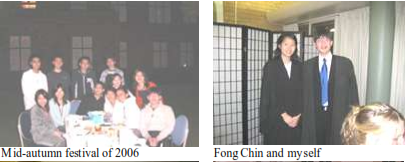
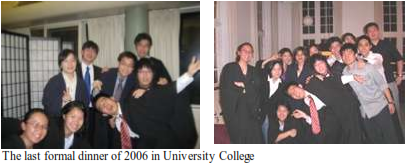
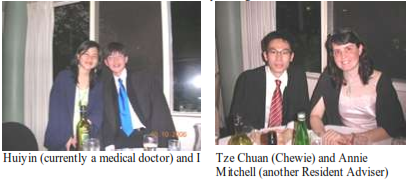
Personally, I hate it when residents lock themselves out. Even though I will wake up to unlock their doors, residents who knows me even a bit knows that I can be tempermental about lockouts. It is really their luck. I think the worst night was when there were 4 lockouts and the last 2 got a scolding from me. Just bad luck – I am usually alright and can keep my cool up to the second lockout of the night. I must say that some residents are considerate enough to bunk in with their friends if they got locked out. Having said that, being an RA had really enriched my life significantly.
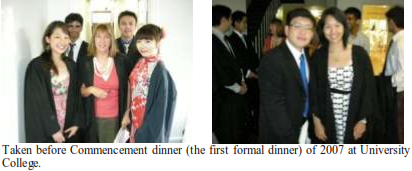
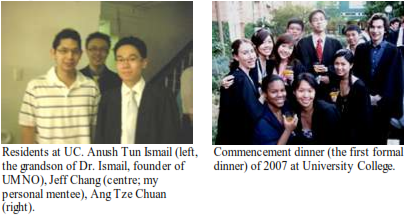
I think something out there did not like Ginny (Virginia Bratton) very much. She seems to have the most number of lockouts and unbelievable events during her duties. I remembered that it was early July of 2006 when we had some exchange students from America as residents. There was this guy whom I had forgotten his name but certainly did not strike a good impression with his language. Anyway, his friends played a trick on him and Ginny was on duty that day. His friends leaned a large bucket of soapy water on his door and knocked on his door. He opened the door and the bucket splashed on him. Instinctively, he chased after his friends down the corridor and locked himself out in the process – topless. He went to Ginny and got a scolding from her but after knowing the prank, Ginny was very sympathetic and gotten him some bedsheets from the laundry room to help him clean up his mess of soapy water in his room. Well, Ginny has a tender heart.
There is really far too much to be mentioned about my stay in UC that it will probably take an entire book to talk about them, even if I can remember all of them. As I am writing this autobiography, I do regret not keeping a diary throughout my tertiary education days or even my postgraduate days or even just for this period in UC – there will be so much in there. I will just mention a few more memorable things and events during this period of my life.
For both years, I was living in the second largest RA apartment, which used to be the apartment for facilities manager. My apartment was the only one with a full kitchen and a decent-sized living room overlooking the courtyard. I really love that room even though I have to pay a bit more for the size. The good thing was that I would have my bathroom cleaned every Tuesday by the cleaners. Genevieve had the largest apartment; in fact, I will call it a house with a small car pouch and her herb garden. Yes, Genevieve enjoys working in her garden and enjoying the fruits of her labour. I recalled a day when she was pretty upset when she had planned to harvest snowpeas and cook for dinner the following day but woke up to find that a possum had chewed her snowpeas up before she could harvest them.
I went through 2 RA teams in 2006 and 2007, as well as a bit in 2008. Originally, I had wanted to return to UC in February to March 2008 as an academic visitor to clear up more writing before moving back to Singapore under circumstances that I will explain in the next chapter. However, I was asked by Dr. Deborah Seifert, Head of UC, if I was willing to serve as RA for the 2 months during which I was back and I agreed.
There were a total of 9 RAs, including Genevieve who was the Senior RA. We had a very diverse team of RAs in terms of academic interests and background and it was by design. The idea was that all residents have someone to talk to and seek advice from. Out of the 14 RAs that I worked with over the 2 years, there were
-
Elenor Lee (a Research Assistant in epidemiology and has to deal with human organs and blood samples on a daily basis)
-
Annie Mitchell (a teacher but was doing her PhD in education)
-
Misty Jenkins (a PhD student working on influenza virology in Peter Doherty’s lab)
-
Justin Dzau (a M&A lawyer)
-
Ren Yi (a Mongolian by descent with a good voice for Mongolian songs and was a Senior Research Manager in Victoria University)
-
Helen Yang (from China and doing her PhD in economics)
-
Michelle Segal and Scott Crawford (Michelle was a Publications Officer at University of Melbourne and Scott is her husband)
-
Shelly Rodrigo (from West Indies and doing her PhD in epidemiology)
-
Virginia Bratton (Lecturer in human resource management. She is now at University of Montana, USA.)
-
Alexander Buirski (ex-Pentathlon sportsman)
-
Matthew Hazledine (ex-UC resident and banker)
-
Jonathan Coquet (PhD in immunology)
On the whole, I would say that the RA teams were closely knitted and we could and were willing to stand-in for each other whenever someone needed an urgent change of duties. Genevieve was the duty planner but we were allowed to swap duties mutually. The worst that we had ever had was a 3-way swap. Probably Genevieve had some idea but I always felt that less than half of the allocated duties were really done by the RA originally assigned. One thing I did know was that I was the swapper of the year for 2007 – whenever anyone had duty allocation issues, I would be available for swaps if I happened to be free on those days. I always felt that the negotiating to change duties to be an entertaining aspect of being an RA – if I had to swap my duties, I would have to talk to each RA until I could find someone willing to swap with me. For the record, I had never ever needed to go to a 4th RA to get my swap.
We had made it very clear to the parents on the first day when the students checked in at the beginning of the academic year that we, as a college, do not play the role of a surrogate parent. We viewed the residents as adults and we treated them as adults. Our role was to provide support and advice so that they can excel in their own field of choice. As such, residents’ welfare is our priority. Personally, I always felt that I interacted better with residents who are international students compared to the locals and I made no apologies about it. I think that was something that I can bring to the RA mix. I aim to have a meal each day with the students whenever possible.
Over time, I had designed a structured routine around my meal times for residents to talk to me. I will be at the dining hall at about 7.15am to 7.30am during weekdays to start my breakfast. The dining hall sits in the middle of the college. Whenever there is hot breakfast, such as Tuesdays and Fridays, I will be earlier. I will have my toast and I love my raisin toasts with Vegemite, with a bowl of yoghurt and honey, before proceeding to a cup of hot tea with honey as well. I will leave for my office at about 8.15am to 8.30am. If I am early enough for breakfast, like 6.30am, I can even see some residents doing the “walk of shame” when they walked out of someone else’s room where they had spent the night in and going back to their own respective rooms. By about noon, I will be back for lunch and enjoy a cup of tea before meeting Edwin for coffee in the university. Together with dinner, I will be spending about 3 hours a day in the dining room which provides ample time for anyone to talk to me if needed without knocking on my door. My meal times are like my consultation hours in some sense and that seems to work pretty well. Usually I will also try to alternate – a meal sitting with the residents and another meal sitting with the RAs or academic visitors.
The college has a policy that we can order sandwich lunch if we are not in for lunch that day. We can choose the sandwich fillings. Justin, being a lawyer at CBD, will never make it back for lunch and he will order sandwich lunch everyday. Being a guy with a decent appetite, Justin will always try to pack as many different types of salads and meat into his sandwich. One day, he told me that the kitchen staffs got pissed off at him or something and gave him his designated 2 sandwiches, with a catch – one sandwich of pure vegetables and one sandwich of the meats. I just have to laugh when I heard about it that evening.
One of the unusual events that happened in college was during a Saturday evening when the power was down. That was about 2 years after the London bombing and we thought that there was a terrorist attack in Melbourne. It turned out that a nearby substation was on fire; thus, all the electrical power in Parkville was down. Shelly was on duty that evening and I decided to stay with her in the lobby throughout the night as the main doors had to be left open for students to come back and I did not feel safe to just have one RA guarding the gate.
In 2007, I had the pleasure of working with Maurice at the University College as part of a team of Resident Advisors. Maurice is a goals oriented person with a positive and cheerful disposition. In times of trouble one can count on Maurice's support. There was an incident where power was knocked out one night while I was on duty and the security of the residence was compromised since the main doors were open. Maurice was my steadfast companion, providing repast and light relief throughout the night. Maurice has a wide range of interests from finance to biology and his conversations are always thought provoking and insightful.
-- Shelly Rodrigo (March 23, 2008)
Academic visitors formed an important aspect of collegial life. I will say that they are the icing and sparkles. Without them, college life can be rather monotonous. Academic visitors seem to provide that extra intellectual simuli that we all need. It is really disappointing that I am not able to remember all of them, much less all of their names. This is another reason for me to keep a diary. Despite so, there are some really notable ones that I can recall their names, which is an amazing feat in itself.
John White{3}, FRS, is a Professor of Chemistry at Australian National University, working on self-assembly chemistries. He is a very interesting person who offered me a lot of advice and insights into the history of scientific thoughts. I believe John was the one who gave new insights into my doctoral work that I am really isolating the individual biological components and the associations between them, which can be used to model biology in a large scale. In academic world, I will consider him to be highly-decorated.
Ruth Taylor{4} is a lecturer of management at Curtin University in Perth. She attended my final PhD seminar and is a very delightful lady to have meals with. Throughout my stay in UC, I think she stayed in UC trice to work on her doctoral thesis. I remembered an incident that she told me during one of the conferences that she had attended. The speaker was studying electric companies and had a sample size of about 100 (I cannot remember the exact number but Ruth knew about it). An audience questioned the speaker’s work and said that the sample size was too small to draw her conclusions, to which, the speaker replied “but that’s the entire population!” I had a good laugh even though I am not sure if it was the audience’s arrogance or ignorance that I am laughing at or the fact that a population can be studied.
Douglas Arner{5} is the current Head of Law in University of Hong Kong. Then, there was a Universitas 21 fellowship programme and Douglas was one of the fellows. In his words, it is actually a fellowship that enabled long-paid leave for academics to visit another university for an extended period. I think Douglas might have spent a total of 6 to 8 months in the law faculty at University of Melbourne. Douglas told me that nothing beats face-to-face meeting in Hong Kong, especially when job hunting is concerned, and he had flown to HK to approach the university himself. What strikes me is percular was that Douglas’ posture in the photo on his university website is highly authoritative, with rows of colour-matched and bounded legal journals in background. Yet, he is an extremely friendly person and Genevieve did say that the authoritative image is needed for his profession and I really agree.
Arthur Forer{6} is a professor emeritus at York University in Canada who is collaborating with the School of Botany at Melbourne University, working on chromosome movement during mitosis. Basically, the chromosomes will line up at the centre of the cell during mitosis (specifically, metaphase) and at the start of anaphase, the chromatids will move towards the poles of the cell, but why? How did the spindle poles know when to start the process and how to coordinate the speed of chromatids movement? That is Arthur’s life-long research. It is amazing to me that so much is unknown even from first year genetics, and we thought that we knew all of these. How Arthur got to collaborate with Melbourne University is also interesting – apparently, someone at Melbourne University had some serious criticisms to one of his earlier papers and Arthur thought that correspondence is a poor way to resolve this conflict. Hence, he flew to Melbourne to meet up his critic whom eventually became his collaborator. Despite his age (about 70), he routinely cycles from Parkville to Mount Dandenongs during the weekends – about 100km return trip. Arthur had my admiration. I believe Arthur and his wife (a retired nurse or teacher, I cannot even remember now) came to Melbourne twice when I was an RA, during the summers. I remembered clearly that it was the middle of winter when they had to go back to Canada and dreaded the snow and the possibility of having to dig their way through the snow after a 32-hour door-to-door journey back home. He was always sad to have to go back home due to the winter.
Christopher Lawrence – a very interesting man with a very interesting background. His family is a Nobel family and his eldest brother has the heritary title of a Lord. I am always confused as to whether Chris came from Cambridge or Oxford. He stayed in UC to translate a French play into English. We all love the way he talks and argues – extremely well-mannered even in heated arguments, and with a sporting long ponytail. Jeff once said that Chris is like one of those people from manga – even the lifting of a glass will explode stars of well-manners around him. That is certainly how I felt.
Liu Shiang-Tung{7} is a professor in eduation in National Chiayi University in Taiwan. He was on sabbatical leave, attached to the education faculty at Melbourne University. His research area is on mathematics education and had long conversations with Annie Mitchell, an RA doing her PhD in mathematics education as well. Shiang-Tung thinks that the Chinese language actually helps Chinese to learn and process fractions as “one third” in Chinese will be written as “three parts taken one”; hence, Shiang-Tung felt that the English wordings for fractions required stack processing – remember the “one” then process the “thirds” – and that is not required to process Chinese wordings for fractions.
Out of all the routine activities, I love high table dinners, which happened every Monday and Tuesday evening. I made it a point to try to attend every high table if possible, even though the general requirement for RAs is to attend one high table a week. I was told that high table was an Oxbridge tradition where everyone will be dressed in academic gown for a semi-formal dinner. If you had watched Harry Potter, the dinner is what high table will remind me of. Of course, our real intention is to use it to educate residents on proper dining manners. Mind you, I had seen a number of cases whereby residents seem to have just discovered a fork. During the dinner, students will be sitted at the usual round tables and the college staffs, including RAs, and academic visitors will be sitted on a long table. Several residents will be invited to sit on high table (the long table) at least once a year. Genevieve is the sitting master.
Before high table itself, there is drinks reception at the Senior Common Room and I will try to be there as early as possible to serve Port or Sherry and finger foods to our guests. After the dinenr, we will also retire to Senior Common Room to have a cup of tea and continue our conversations.
Maurice was a Resident Adviser (RA) for from May 2006 until March 2008. This position included duties such as ensuring the security of the College buildings at night, informal mentoring of students and pastoral care of students.
He was a most reliable RA, always on time for duty and very accommodating with duties for other RAs with challenging academic or social timetables.. He frequently attended both Monday and Tuesday High Tables and I came to rely on him to be there in the Senior Common Room before the arranged time and thus there was always someone to greet the apartment guests and students and to offer them refreshments.
Maurice was meticulous in carrying out his duties and could be relied upon to provide a succinct but useful report for administration personnel. He interacted with a range of students and became an informal mentor to a number of them. Following on from these interactions he was able to highlight areas in which the College could provide further assistance to students.
At the same time Maurice developed collegial relationships with several of our academic visitors, exchanging ideas and maintaining correspondence with academics from diverse areas of scholarship.
Maurice presented aspects of his academic work at seminars on two occasions at University College and the ensuing discussions were most appreciated by the audiences. He proved to be a valuable member of staff.
-- Genevieve Leach (May 22, 2008)
Well, the RA team was not without its own trauma. There was a case of suicide in Whitley College and we were alerted. Genevieve had to do overtime to provide counselling for the residents there. Thinking back, I am not even sure how that can be prevented. The student was a sportsman and popular with his peers in college, as well as appearing to be cheerful even to the day before his suicide. Nevertheless, he just hung himself in his room. I really do not know what signs I could detect if it had happened in UC.
The Dairy CRC breathed its last in 2007 when the CRC grant to Australian government was rejected. With the increasing Australian drought, dairy production dropped and fewer farmers are willing to be part of it, or so I heard. Nevertheless, I knew that the CRC was in increasing financial trouble since the end of 2005. In the summer of 2007, we had our last Dairy CRC meeting in Gold Coast, Queensland. The atmosphere was not as enjoyable as what it could have knowing the difficult road ahead when our funding is reduced. One of the last sessions of the meeting was a career development workshop and I am really not sure who organized it or whether the facilitators know what they are doing – they were actually guiding everyone, full professors and all, in CV writing. To a large extend, I think this is humiliating. As Sonia later put it, time will be better spent singing Au Lang Syne over a large glass of wine.
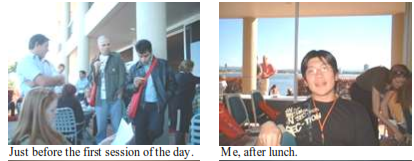
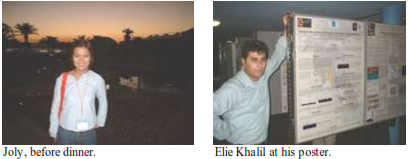
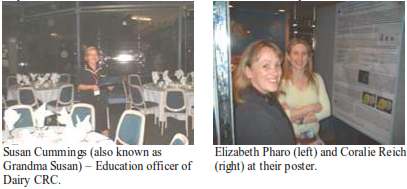
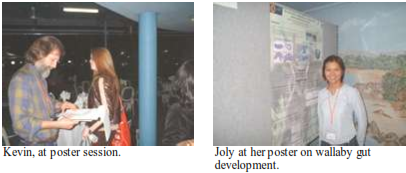
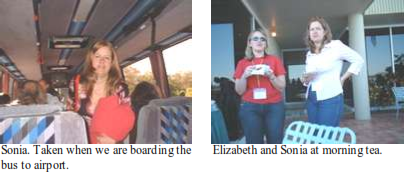
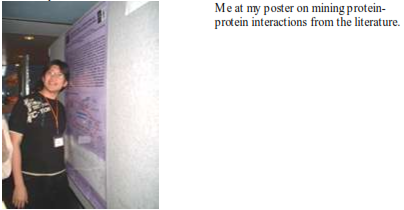
Personally, I think the dwindling and demise of the Dairy CRC has quite an impact on me. It got me to think very hard whether I want to pursue a full-time research career well knowing that this is something that is always looming across the horizon.
The subprime mortgage crisis hit on August 7, 2007, when BNP Paribas terminated from 3 hedge funds. This eventually rolled into Global Financial Crisis of 2007 to 2008 and collapse of Lehman Brothers on September 15, 2008{8}, followed by global recession of 2008 to 2010{9} – the worse financial crisis since Great Depression in 1929. Hence, 2008 to 2010 is also known as the Great Recession. The European Sovereign-Debt Crisis or Eurozone crisis since late 2009 is a continuation of the initial effects in 2007. I estimated that I had lost about SGD 20 thousand within that time, or 18.2% of my assets. It was not a real big deal as I do not use any leverage back then. Even now, I will only use leverage cautiously. Since it happened, I had used this protracted period to toughen my nerves and I think I had emerged out of it substantially stronger.
I left UC on April 1, 2008, which was a Tuesday. I had my last high table dinner as an RA the day before. Deborah gave a short speech about me during the dinner and that was really touching. There is without a doubt that I had learned a lot and experienced a lot during my service as an RA, something that I will never be able to get should I be renting an apartment elsewhere in May 2006. I had good memories of that place – a residential college shrouded in vegetation next to the cemetary.
Deborah left her position as Head of College in May 2008 and Genevieve left UC at the end of 2008 as well.














